八年级英语下册 U1-5综合复习课件(共62张PPT)
文档属性
| 名称 | 八年级英语下册 U1-5综合复习课件(共62张PPT) |

|
|
| 格式 | zip | ||
| 文件大小 | 511.7KB | ||
| 资源类型 | 教案 | ||
| 版本资源 | 人教新目标(Go for it)版 | ||
| 科目 | 英语 | ||
| 更新时间 | 2020-04-27 00:00:00 | ||
图片预览


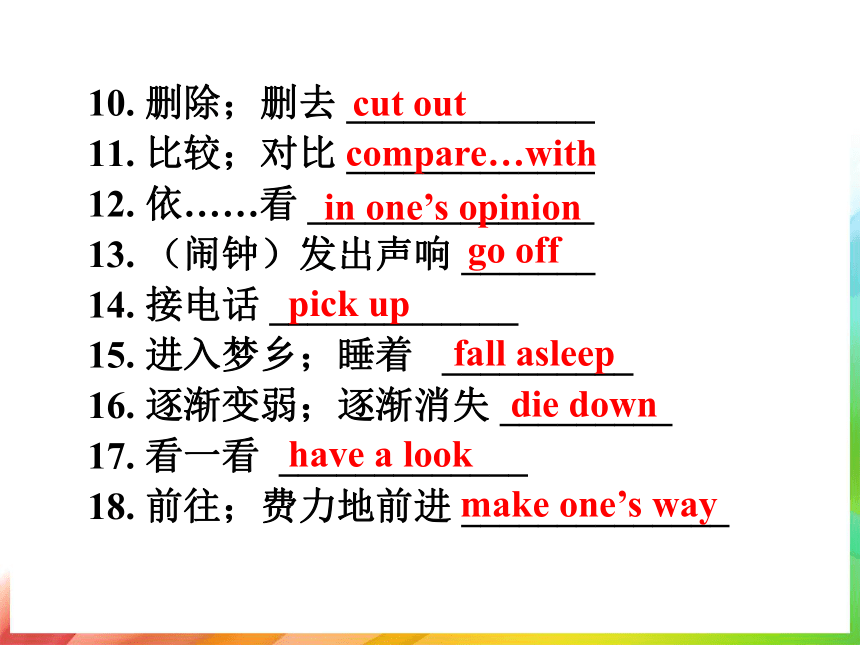
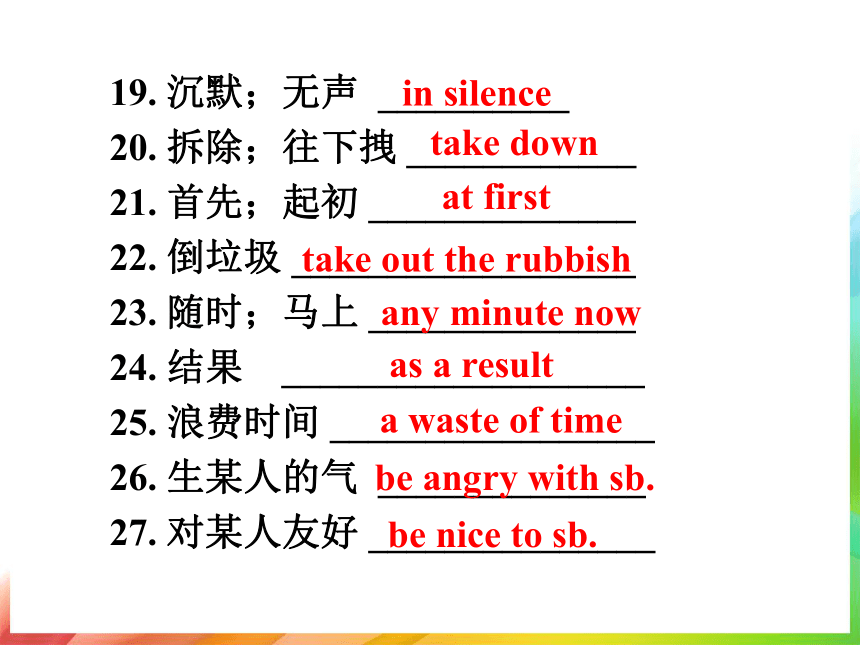
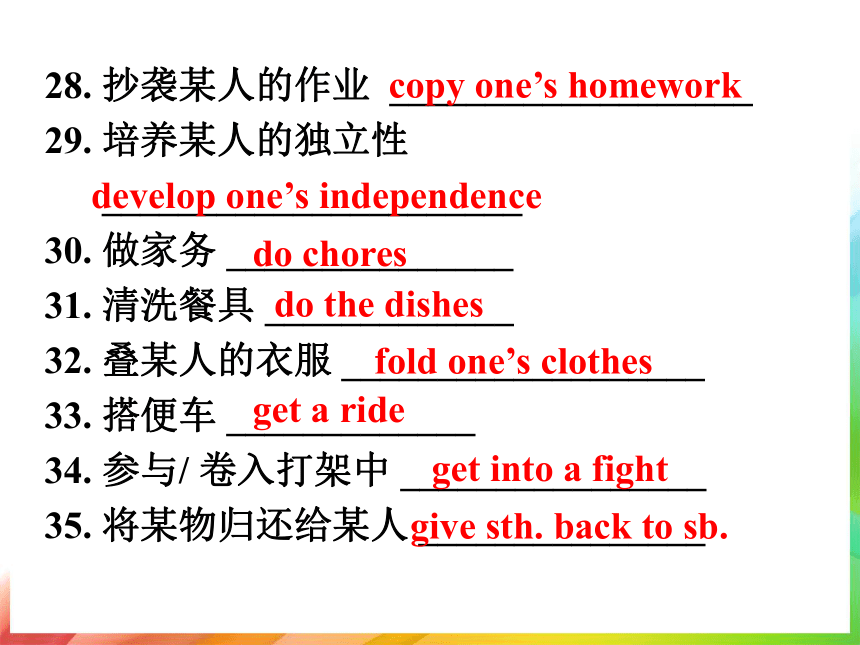

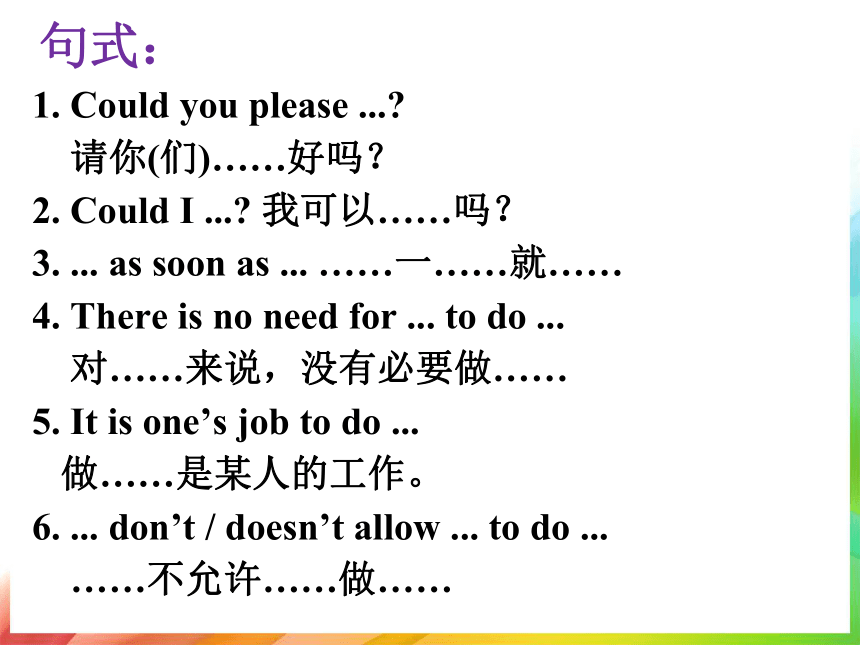
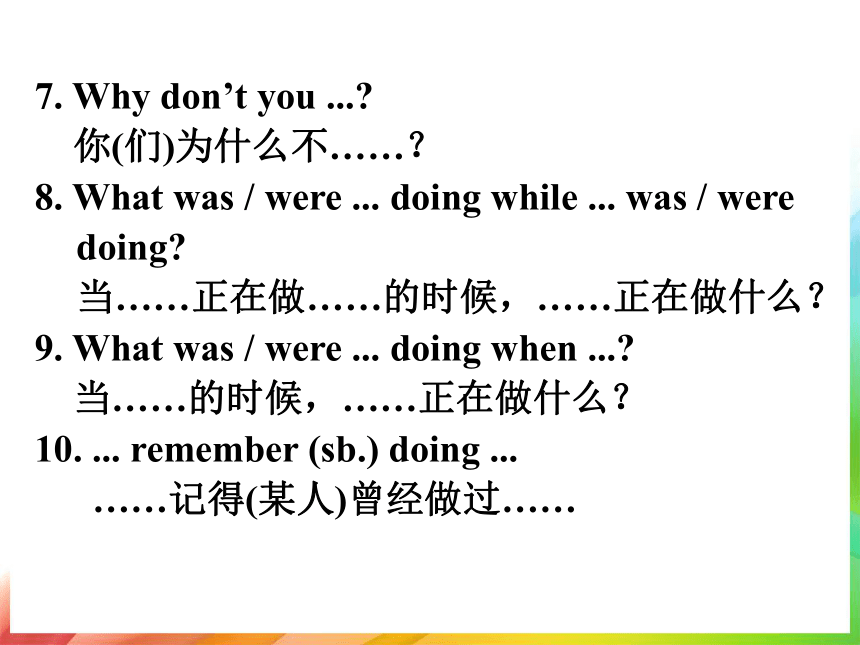
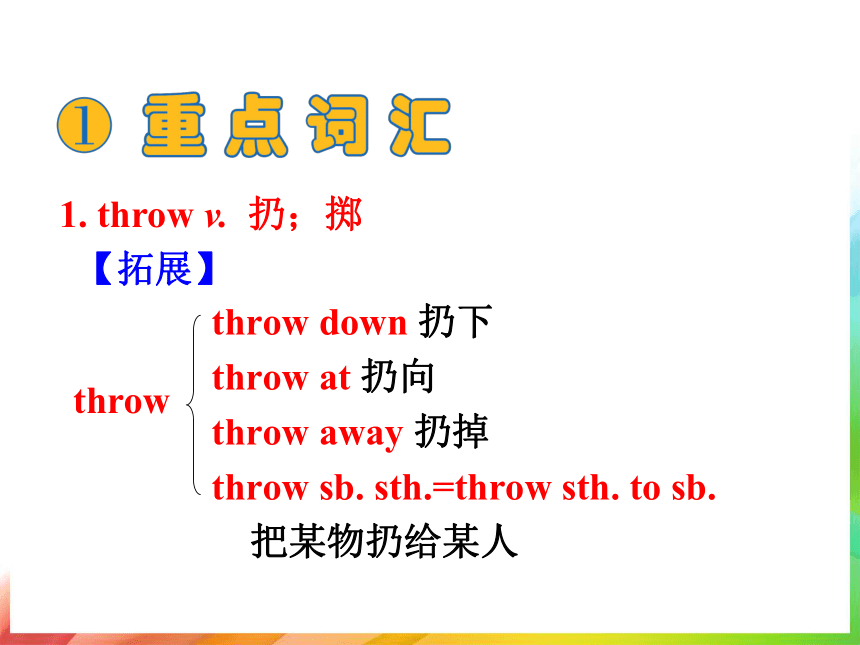
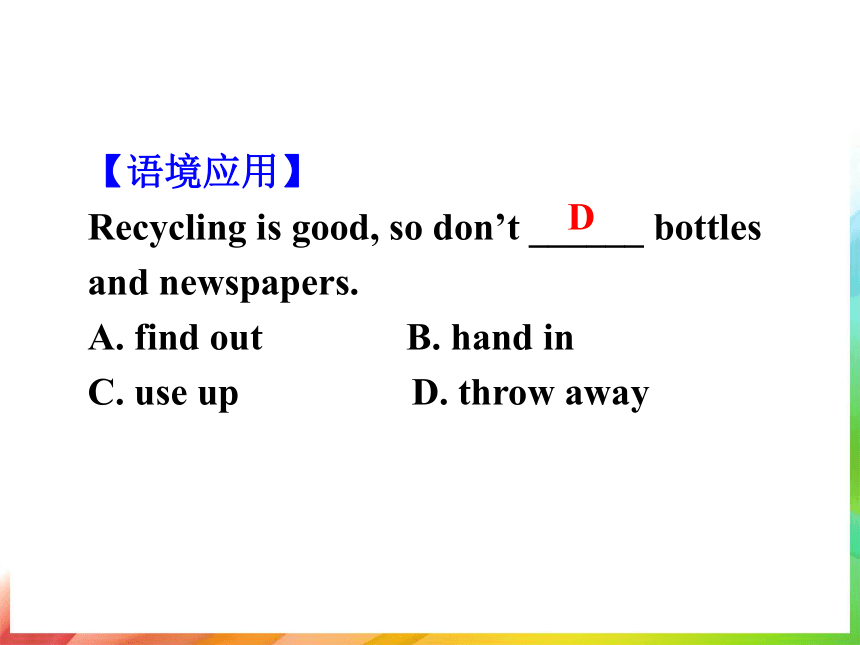
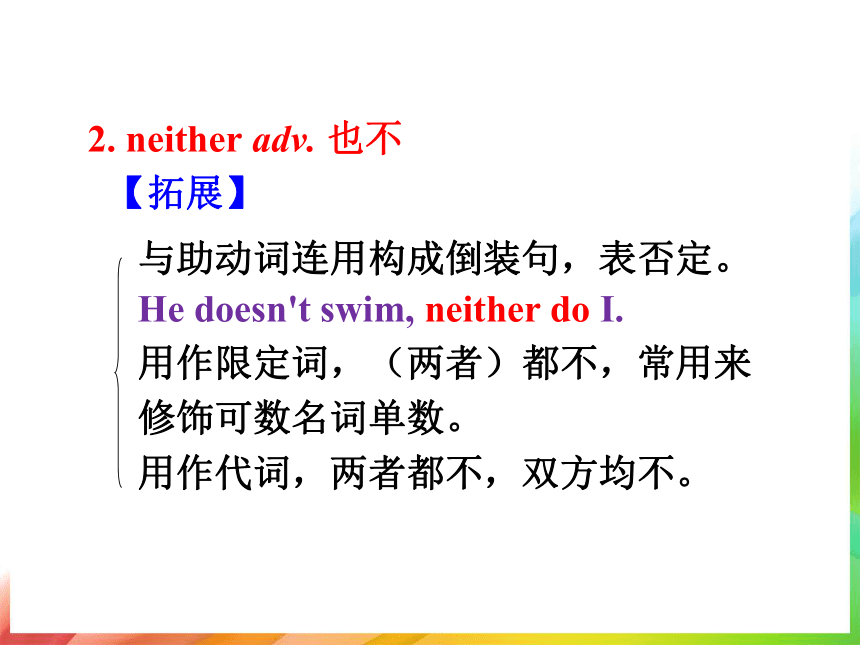
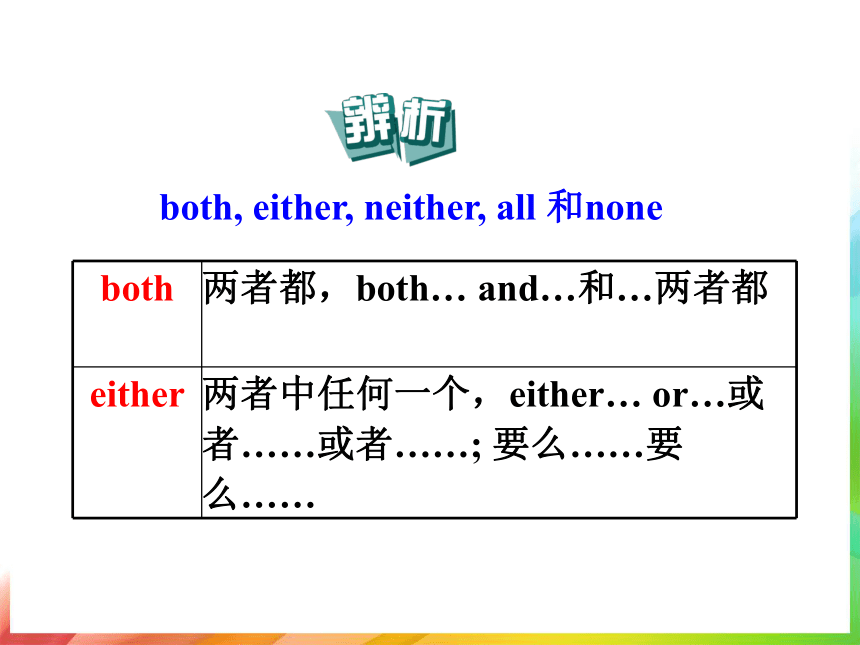
文档简介
课件62张PPT。
Review U1-51.一直,频繁; ______________
2. 一……就…… ______________
3. 目的是;为了 ______________
4. 依靠;信赖 ______________
5. 照顾;处理 ______________
6. 快速查阅;浏览 _____________
7. 重要的事 ____________
8. 成功地发展;解决 ____________
9. 和睦相处;关系良好_____________all the time as soon asin order todepend ontake care oflook throughbig deal work outget on withU1-5词组译一译10. 删除;删去 _____________
11. 比较;对比 _____________
12. 依……看 _______________
13. (闹钟)发出声响 _______
14. 接电话 _____________
15. 进入梦乡;睡着 __________
16. 逐渐变弱;逐渐消失 _________
17. 看一看 _____________
18. 前往;费力地前进 ______________cut out compare…within one’s opinion go off pick upfall asleepdie downhave a lookmake one’s way19. 沉默;无声 __________
20. 拆除;往下拽 ____________
21. 首先;起初 ______________
22. 倒垃圾 __________________
23. 随时;马上 ______________
24. 结果 ___________________
25. 浪费时间 _________________
26. 生某人的气 ______________
27. 对某人友好 _______________in silencetake down at firsttake out the rubbishany minute nowas a resulta waste of timebe angry with sb.be nice to sb.28. 抄袭某人的作业 ___________________
29. 培养某人的独立性
______________________
30. 做家务 _______________
31. 清洗餐具 _____________
32. 叠某人的衣服 ___________________
33. 搭便车 _____________
34. 参与/ 卷入打架中 ________________
35. 将某物归还给某人 _______________copy one’s homework develop one’s independencedo chores do the dishes fold one’s clothes get a ride get into a fight give sth. back to sb. 36. 一团糟 ______________
37. 在困难的时候
__________________________
38. 借给某人某物 _____________
39. 扔下 ________________in a messin times of difficultylend sb. sth.throw down 1. Could you please ...?
请你(们)……好吗?
2. Could I ...? 我可以……吗?
3. ... as soon as ... ……一……就……
4. There is no need for ... to do ...
对……来说,没有必要做……
5. It is one’s job to do ...
做……是某人的工作。
6. ... don’t / doesn’t allow ... to do ...
……不允许……做……句式:7. Why don’t you ...?
你(们)为什么不……?
8. What was / were ... doing while ... was / were doing?
当……正在做……的时候,……正在做什么?
9. What was / were ... doing when ...?
当……的时候,……正在做什么?
10. ... remember (sb.) doing ...
……记得(某人)曾经做过…… throw down 扔下
throw at 扔向
throw away 扔掉
throw sb. sth.=throw sth. to sb.
把某物扔给某人throw1. throw v. 扔;掷
【拓展】【语境应用】
Recycling is good, so don’t ______ bottles and newspapers.
A. find out B. hand in
C. use up D. throw awayD2. neither adv. 也不
【拓展】与助动词连用构成倒装句,表否定。
He doesn't swim, neither do I.
用作限定词,(两者)都不,常用来修饰可数名词单数。
用作代词,两者都不,双方均不。both, either, neither, all 和none3. borrow v. 借;借用
borrow / lend
borrow借入
borrow sth. from sb.向某人借某物。
lend借出
lend sth. to sb.把某物借给某人。4. provide v. 提供;供应
【拓展】
provide sb. with sth.
= provide sth. for sb. 给某人提供某物
offer sb. sth. =offer sth. to sb.
给某人提供某物【语境应用】同义句转换。
Could you provide us with water?
Could you _______ water _____ us?provide for development n. 发展
developing adj. 发展中的
developed adj. 发达的
fairly adv. 合理地;公正地
unfair adj. 不合理的;不公正的
fairness n. 合理;公正developfair5. develop v. 发展;培养
【拓展】6. fair adj. 合理的;公正的
【拓展】7. allow v. 允许;准许
【拓展】
allow sb. to do sth. 允许某人做某事
allow doing sth. 允许做某事
【语境应用】
My parents didn’t allow me ______ to the party.
A. go B. to go C. goes D. wentBallow8. argue vi. 争吵;争论
【拓展】
argue with sb. 和某人争吵
argument n. 争吵;争论9. compete v. 竞争;对抗
【拓展】
compete with sb. 与某人竞争
competition n. 比赛;竞争competeargue10. elder adj. 年纪较长的,前辈的(指人)
elder/older
elder在名词前作定语,不能用在be动词或系动词后作表语。
older年长的,用作表语,可用比较状从。
(older人物表定可比状)
【语境应用】用elder/older完成句子。
1) — Do you know the girl over there?
— Yes, I do. She is my ______ sister.
2) Tony is ______ than me. elderolder offer to do sth. 主动提出做某事
offer sb. sth.=offer sth. to sb.
主动给某人某物offer11. offer v. 主动提出;自愿给予
【拓展】compare A with B
把A与B做比较
compare A to B
把A比作Bcompare12. compare v. 比较
【拓展】beginner n. 初学者
beginning n. 开始;开端
at the beginning of… 在……的开始
短语 begin to do sth. 开始做某事
begin doing sth. 开始做某事
begin with…以……开始
反义词 finish v. 结束 end v. 结束
近义词 start v. 开始begin13. begin v. 开始 (began, begun)
【拓展】14. rise v. &n. 升起;增加;提高
rise/raise
rise vi. 升起,起来,起身
raise vt. 举起;抬起;增加【语境应用】用rise或raise完成句子。
1) The sun _______ in the east and sets
in the west.
2) If you know the answer, please
______ your hand.risesraise1. come over 过来;顺便来访
【拓展】动词+over的短语:
think over 仔细考虑
get over 克服
take over 接管
look over 仔细检查
go over 复习;检查2. all the time 一直;总是
【拓展】time短语
for the first time 第一次
from time to time 有时;偶尔
at times 不时;有时
in time 及时(just in time)
on time 按时
at the same time 同时
at any time 随时
in no time 立即;马上3. as soon as 一……就……
如果主句为将来时态,其引导的从句通常用一般现在时表示将来。
【拓展】
as soon as possible尽快(ASAP)【语境应用】
—Will you please give The Readers
Times to Jane?
—Sure, I’ll give it to her _______ she
comes back.
A. before B. until
C. because D. as soon asD4. depend on 依靠;信赖
由……决定;取决于
【拓展】动词+on的短语
turn on 打开 get on 上车
come on 快点 insist on 坚持
call on 号召 live on 以……为生
depend on 依靠 put on 穿上;戴上【语境应用】
We are planning to go for a picnic this weekend, but it _______ the weather.
A. keeps on
B. puts on
C. depends onC5. work out 成功地发展;解决
【拓展】动词+out短语
set out 出发 put out 熄灭
point out 指出 hand out 分发
run out 用完 give out 分发;散发
come out 出版 look out 小心;当心
turn out 结果是 take out 取出
break out 爆发6. cut out 删除;删去
【拓展】cut短语
cut in line 插队
cut off 切除
cut in 打断
cut down 砍伐
cut up 切碎7. pick up 接电话
【拓展】pick up含义
拾起;捡起
e.g. He picked up his cap and went away.
开车去接
e.g. I will go to the airport and pick up my uncle.
习得(知识,语言)
e.g. He picked up the language when he lived in China.【语境应用】
—Do you ______ your son after school?
—No. He comes back home on the school bus.
pick up B. look after
C. drop in D. send forA8. fall asleep 睡着
asleep adj. 睡着的
【拓展】fall短语
fall behind 落后
fall off 跌落;减少
fall down 跌倒
fall ill 生病
fall into 落入;掉入9. take down 拆除;往下拽;记录
【拓展】take down含义
记下;写下
e.g. All the students took down the speech.
拿下;取下
e.g. Did he take down the green flag?10. at first 首先;起初
at last 最后;终于【语境应用】
______ I thought he was shy, but then I discovered he was just not interested in other people.
A. As usual B. At first
C. After all D. So farB1. …when they get elder, they will have to do housework so there is no need for them to do it now….
there is no need (for sb.) to do sth.
(对某人来说)没必要做某事
e.g. 没必要乘坐公共汽车去那里。
_______ ____ ______ _____ go
there by bus. There’s no need to2. Why don’t you go to sleep earlier this
evening?
Why don’t you do sth.?= Why not do sth.?
回答:Good idea!/ Sure!/ Good!
表示赞同。如果表示反对,直接说出理由。过去进行时一、基本用法
表示过去某一时刻或某一段时间正在进行的动作,常与其连用的时间状语有at ... (o’clock) yesterday / last night,at this time yesterday,at that time / moment等。如:语法学一学用于含有when或while引导的时间状语从句的复合句中。
若when/while引导的从句的动作发生了,主句的动作正在进行,则从句用一般过去时,主句用过去进行时。如:
When her mother came in, May was playing the piano.
The students laughed, while the teacher was writing some words on the board.when / while引导的从句都可表示过去发生的动作,但when从句中的动词可以是瞬间动词,也可以是延续性动词,而while从句中的动词必须是延续性动词。
若when / while引导的从句的动作正在进行,主句的动作发生了,则从句用过去进行时,主句用一般过去时。如:
He met his friend when he was studying in London.
I began cooking while the water was heating.while引导的状语从句还可表示从句的动作正在进行的同时,主句的动作也在进行之中。如:
While Linda was sleeping, Jenny was helping Mary with her homework.
有时由上下文表示出来。如:
—You were out when I dropped in at your
house.
—Oh, I was waiting for a friend from England
at the airport.二、句式结构
肯定句:
主语+ was/were+动词-ing+其他
否定句:
主语+ was/were+not+动词-ing+其他
一般疑问句:
Was/Were主语+动词-ing+其他?三、与一般过去时的区别
过去进行时强调动作在过去“正在进行”;一般过去时则强调动作“发生”在过去或状态在过去“存在”。如:
Sue was writing an e-mail to her friend at that time. ?(强调“正在写”)
Sue wrote an e-mail to her friend last night. ?(强调发生了“写”的动作)
Sue was tired last night.? (强调过去的状态)although, so that和until
(Unit 4)although conj.虽然;尽管,引导让步状语从句。从句既可放在主句之前,也可放在主句之后。
although或though不能和but同时出现在一个句子中,但它们之间可进行句型转换。如:Although/Though we lost the game this time, we are a good team.
He ran out to look for his dog(,) although /though it was raining heavily at that time.?
?
Although/Though he liked the toy plane very much, he didn’t buy it.
= He liked the toy plane very much, but he didn’t buy it.so that是连词,既可引导目的状语从句,也可引导结果状语从句。
引导目的状语从句时,以便;为了,从句中常用can, could, may等词;
引导结果状语从句时,从句中一般不用这类词,因此;结果。如:
I opened the window so that the fresh air could come in.???? (引导目的状语从句)
The concert was boring so that some of the students fell asleep.? (引导结果状语从句)until conj. & prep.
肯定句时,一直到……时(为止),until表示句子的动作或主句的动作一直持续到until短语所表示的时间或until引导的从句动作发生或状态出现为止,句中或主句中的动词为延续性动词。如:
I slept until ten this morning.
Let’s wait until the rain stops.否定句时,直到……才……。until表示句子的动作或主句的动作在until短语所表示的时间或until引导的从句动作发生或状态出现之后开始。如:
I didn’t get up until Paul had gone. Peter with his classmates ______ for the
bus when the earthquake happened.
(2019甘肃兰州)
A. is waiting B. was waiting
C. are waiting D. were waitingB2. —Were you at home at 9 o’clock last night?
—Yes, I ______ a shower at that time.
(2019甘肃天水)
A. took B. was taking
C. was taken D. am takingB3. Amon ______ his ship in a big storm when a giant fish came out of the sea.
(2019江苏苏州)
A. will sail B. is sailing
C. was sailing D. has sailedC4. —Alex, Why didn’t you answer my call at nine last night?
—Sorry, I _____ my mobile phone at home. I _____ basketball in the park with my friends. (2019 四川达州)
A. forgot; played
B. forgot; was playing
C. left; played
D. left; was playingD5. Tom won’t go to bed until his father ______back from work.
(2019贵州黔南、黔东南、黔西南)
A. will come B. came
C. comes D. comeC6. —May I go and play with Dick, Mum?
—No, you can’t go out ______ your homework is being done. (2019 广西柳州)
A. Before B. as C. untilC7. A recent survey shows that 44 percent of Americans want to use self-driving cars, _____ 34 percent believe that they will make the roads more dangerous.
(2019山东临沂)
A. although B. because C. ifA8. Cathy is afraid of dogs. She will run away ______ she sees it. (2019四川内江)
A. ever since B. although
C. as soon as D. so thatC9. My sister with my parents _____ dumplings when I got home yesterday evening.
(2018 兰州)
A. are making B. is making
C. was making D. were makingC 1. 我下班一回家就给你打电话。? (as soon as)
2. 她正在厨房做饭时,电话铃响了。 (while)
3. 她昨天来这里是为了见我。? (in order to)
4. 考试前紧张很正常。? (it’s normal to ...)I’ll call you as soon as I come home from work.
While she was cooking in the kitchen, the phone rang.
Yesterday she came here in order to meet me.
It’s normal to be nervous before an exam.重点练一练
Exercises5. 对于你来说没有必要减肥。 (there is no need for sb. to ...)
6. 上周他主动要帮助我们清扫公园。(offer to do)
7. 你工作越努力,你得到的越多。 (the+比较级,the+比较级)
8. 当我给你打电话时你在干什么?? (when)There is no need for you to lose weight.
He offered to help us (to) clean up the park last week.
The harder you work, the more you will get.
What were you doing when I called you? 阅读短文,选择恰当的词填空。
I’m Yuji Minami?from Japan. Last Thursday I gave a(n) (1)_______ about television advertisements (广告) in my conversation class. I talked about Japanese advertisements, (2)_______ I spoke in English!
First, I spoke about a Master Card advertisement. In this advertisement, there is a businessman and a businesswoman. speechnervous, busy, speech, like, real, but, pay, mistake, call, introducebutThey are (3)_______ and in a hurry, and they want to take a taxi. However, there is a traffic jam (交通堵塞). Then, they take a helicopter (直升机) and finally they (4)_______ with a Master Card. This advertisement is humorous and interesting. I was really nervous while I was (5)_________ it. I spoke slowly to avoid (6)_______. busynervous, busy, speech, like, real, but, pay, mistake, call, introducepayintroducingmistakesNext, I talked about a Pepsi Cola advertisement. The Japanese Pepsi company uses a character (7)_______ Pepsiman. It is a cartoon. I think this advertisement is also humorous. To my joy, I was becoming (8)__________.
Finally, I talked about an English conversation company advertisement. They use famous people to advertise. callednervous, busy, speech, like, real, but, pay, mistake, call, introduceless nervousThese famous people are Americans (9)_______ Mariah Carey. After I gave my opinion on the advertisement, I ended my speech saying that I (10)_______ enjoyed this kind of class work, but it was a very serious thing to speak in front of the class in English!like?nervous, busy, speech, like, real, but, pay, mistake, call, introducereally ?
Review U1-51.一直,频繁; ______________
2. 一……就…… ______________
3. 目的是;为了 ______________
4. 依靠;信赖 ______________
5. 照顾;处理 ______________
6. 快速查阅;浏览 _____________
7. 重要的事 ____________
8. 成功地发展;解决 ____________
9. 和睦相处;关系良好_____________all the time as soon asin order todepend ontake care oflook throughbig deal work outget on withU1-5词组译一译10. 删除;删去 _____________
11. 比较;对比 _____________
12. 依……看 _______________
13. (闹钟)发出声响 _______
14. 接电话 _____________
15. 进入梦乡;睡着 __________
16. 逐渐变弱;逐渐消失 _________
17. 看一看 _____________
18. 前往;费力地前进 ______________cut out compare…within one’s opinion go off pick upfall asleepdie downhave a lookmake one’s way19. 沉默;无声 __________
20. 拆除;往下拽 ____________
21. 首先;起初 ______________
22. 倒垃圾 __________________
23. 随时;马上 ______________
24. 结果 ___________________
25. 浪费时间 _________________
26. 生某人的气 ______________
27. 对某人友好 _______________in silencetake down at firsttake out the rubbishany minute nowas a resulta waste of timebe angry with sb.be nice to sb.28. 抄袭某人的作业 ___________________
29. 培养某人的独立性
______________________
30. 做家务 _______________
31. 清洗餐具 _____________
32. 叠某人的衣服 ___________________
33. 搭便车 _____________
34. 参与/ 卷入打架中 ________________
35. 将某物归还给某人 _______________copy one’s homework develop one’s independencedo chores do the dishes fold one’s clothes get a ride get into a fight give sth. back to sb. 36. 一团糟 ______________
37. 在困难的时候
__________________________
38. 借给某人某物 _____________
39. 扔下 ________________in a messin times of difficultylend sb. sth.throw down 1. Could you please ...?
请你(们)……好吗?
2. Could I ...? 我可以……吗?
3. ... as soon as ... ……一……就……
4. There is no need for ... to do ...
对……来说,没有必要做……
5. It is one’s job to do ...
做……是某人的工作。
6. ... don’t / doesn’t allow ... to do ...
……不允许……做……句式:7. Why don’t you ...?
你(们)为什么不……?
8. What was / were ... doing while ... was / were doing?
当……正在做……的时候,……正在做什么?
9. What was / were ... doing when ...?
当……的时候,……正在做什么?
10. ... remember (sb.) doing ...
……记得(某人)曾经做过…… throw down 扔下
throw at 扔向
throw away 扔掉
throw sb. sth.=throw sth. to sb.
把某物扔给某人throw1. throw v. 扔;掷
【拓展】【语境应用】
Recycling is good, so don’t ______ bottles and newspapers.
A. find out B. hand in
C. use up D. throw awayD2. neither adv. 也不
【拓展】与助动词连用构成倒装句,表否定。
He doesn't swim, neither do I.
用作限定词,(两者)都不,常用来修饰可数名词单数。
用作代词,两者都不,双方均不。both, either, neither, all 和none3. borrow v. 借;借用
borrow / lend
borrow借入
borrow sth. from sb.向某人借某物。
lend借出
lend sth. to sb.把某物借给某人。4. provide v. 提供;供应
【拓展】
provide sb. with sth.
= provide sth. for sb. 给某人提供某物
offer sb. sth. =offer sth. to sb.
给某人提供某物【语境应用】同义句转换。
Could you provide us with water?
Could you _______ water _____ us?provide for development n. 发展
developing adj. 发展中的
developed adj. 发达的
fairly adv. 合理地;公正地
unfair adj. 不合理的;不公正的
fairness n. 合理;公正developfair5. develop v. 发展;培养
【拓展】6. fair adj. 合理的;公正的
【拓展】7. allow v. 允许;准许
【拓展】
allow sb. to do sth. 允许某人做某事
allow doing sth. 允许做某事
【语境应用】
My parents didn’t allow me ______ to the party.
A. go B. to go C. goes D. wentBallow8. argue vi. 争吵;争论
【拓展】
argue with sb. 和某人争吵
argument n. 争吵;争论9. compete v. 竞争;对抗
【拓展】
compete with sb. 与某人竞争
competition n. 比赛;竞争competeargue10. elder adj. 年纪较长的,前辈的(指人)
elder/older
elder在名词前作定语,不能用在be动词或系动词后作表语。
older年长的,用作表语,可用比较状从。
(older人物表定可比状)
【语境应用】用elder/older完成句子。
1) — Do you know the girl over there?
— Yes, I do. She is my ______ sister.
2) Tony is ______ than me. elderolder offer to do sth. 主动提出做某事
offer sb. sth.=offer sth. to sb.
主动给某人某物offer11. offer v. 主动提出;自愿给予
【拓展】compare A with B
把A与B做比较
compare A to B
把A比作Bcompare12. compare v. 比较
【拓展】beginner n. 初学者
beginning n. 开始;开端
at the beginning of… 在……的开始
短语 begin to do sth. 开始做某事
begin doing sth. 开始做某事
begin with…以……开始
反义词 finish v. 结束 end v. 结束
近义词 start v. 开始begin13. begin v. 开始 (began, begun)
【拓展】14. rise v. &n. 升起;增加;提高
rise/raise
rise vi. 升起,起来,起身
raise vt. 举起;抬起;增加【语境应用】用rise或raise完成句子。
1) The sun _______ in the east and sets
in the west.
2) If you know the answer, please
______ your hand.risesraise1. come over 过来;顺便来访
【拓展】动词+over的短语:
think over 仔细考虑
get over 克服
take over 接管
look over 仔细检查
go over 复习;检查2. all the time 一直;总是
【拓展】time短语
for the first time 第一次
from time to time 有时;偶尔
at times 不时;有时
in time 及时(just in time)
on time 按时
at the same time 同时
at any time 随时
in no time 立即;马上3. as soon as 一……就……
如果主句为将来时态,其引导的从句通常用一般现在时表示将来。
【拓展】
as soon as possible尽快(ASAP)【语境应用】
—Will you please give The Readers
Times to Jane?
—Sure, I’ll give it to her _______ she
comes back.
A. before B. until
C. because D. as soon asD4. depend on 依靠;信赖
由……决定;取决于
【拓展】动词+on的短语
turn on 打开 get on 上车
come on 快点 insist on 坚持
call on 号召 live on 以……为生
depend on 依靠 put on 穿上;戴上【语境应用】
We are planning to go for a picnic this weekend, but it _______ the weather.
A. keeps on
B. puts on
C. depends onC5. work out 成功地发展;解决
【拓展】动词+out短语
set out 出发 put out 熄灭
point out 指出 hand out 分发
run out 用完 give out 分发;散发
come out 出版 look out 小心;当心
turn out 结果是 take out 取出
break out 爆发6. cut out 删除;删去
【拓展】cut短语
cut in line 插队
cut off 切除
cut in 打断
cut down 砍伐
cut up 切碎7. pick up 接电话
【拓展】pick up含义
拾起;捡起
e.g. He picked up his cap and went away.
开车去接
e.g. I will go to the airport and pick up my uncle.
习得(知识,语言)
e.g. He picked up the language when he lived in China.【语境应用】
—Do you ______ your son after school?
—No. He comes back home on the school bus.
pick up B. look after
C. drop in D. send forA8. fall asleep 睡着
asleep adj. 睡着的
【拓展】fall短语
fall behind 落后
fall off 跌落;减少
fall down 跌倒
fall ill 生病
fall into 落入;掉入9. take down 拆除;往下拽;记录
【拓展】take down含义
记下;写下
e.g. All the students took down the speech.
拿下;取下
e.g. Did he take down the green flag?10. at first 首先;起初
at last 最后;终于【语境应用】
______ I thought he was shy, but then I discovered he was just not interested in other people.
A. As usual B. At first
C. After all D. So farB1. …when they get elder, they will have to do housework so there is no need for them to do it now….
there is no need (for sb.) to do sth.
(对某人来说)没必要做某事
e.g. 没必要乘坐公共汽车去那里。
_______ ____ ______ _____ go
there by bus. There’s no need to2. Why don’t you go to sleep earlier this
evening?
Why don’t you do sth.?= Why not do sth.?
回答:Good idea!/ Sure!/ Good!
表示赞同。如果表示反对,直接说出理由。过去进行时一、基本用法
表示过去某一时刻或某一段时间正在进行的动作,常与其连用的时间状语有at ... (o’clock) yesterday / last night,at this time yesterday,at that time / moment等。如:语法学一学用于含有when或while引导的时间状语从句的复合句中。
若when/while引导的从句的动作发生了,主句的动作正在进行,则从句用一般过去时,主句用过去进行时。如:
When her mother came in, May was playing the piano.
The students laughed, while the teacher was writing some words on the board.when / while引导的从句都可表示过去发生的动作,但when从句中的动词可以是瞬间动词,也可以是延续性动词,而while从句中的动词必须是延续性动词。
若when / while引导的从句的动作正在进行,主句的动作发生了,则从句用过去进行时,主句用一般过去时。如:
He met his friend when he was studying in London.
I began cooking while the water was heating.while引导的状语从句还可表示从句的动作正在进行的同时,主句的动作也在进行之中。如:
While Linda was sleeping, Jenny was helping Mary with her homework.
有时由上下文表示出来。如:
—You were out when I dropped in at your
house.
—Oh, I was waiting for a friend from England
at the airport.二、句式结构
肯定句:
主语+ was/were+动词-ing+其他
否定句:
主语+ was/were+not+动词-ing+其他
一般疑问句:
Was/Were主语+动词-ing+其他?三、与一般过去时的区别
过去进行时强调动作在过去“正在进行”;一般过去时则强调动作“发生”在过去或状态在过去“存在”。如:
Sue was writing an e-mail to her friend at that time. ?(强调“正在写”)
Sue wrote an e-mail to her friend last night. ?(强调发生了“写”的动作)
Sue was tired last night.? (强调过去的状态)although, so that和until
(Unit 4)although conj.虽然;尽管,引导让步状语从句。从句既可放在主句之前,也可放在主句之后。
although或though不能和but同时出现在一个句子中,但它们之间可进行句型转换。如:Although/Though we lost the game this time, we are a good team.
He ran out to look for his dog(,) although /though it was raining heavily at that time.?
?
Although/Though he liked the toy plane very much, he didn’t buy it.
= He liked the toy plane very much, but he didn’t buy it.so that是连词,既可引导目的状语从句,也可引导结果状语从句。
引导目的状语从句时,以便;为了,从句中常用can, could, may等词;
引导结果状语从句时,从句中一般不用这类词,因此;结果。如:
I opened the window so that the fresh air could come in.???? (引导目的状语从句)
The concert was boring so that some of the students fell asleep.? (引导结果状语从句)until conj. & prep.
肯定句时,一直到……时(为止),until表示句子的动作或主句的动作一直持续到until短语所表示的时间或until引导的从句动作发生或状态出现为止,句中或主句中的动词为延续性动词。如:
I slept until ten this morning.
Let’s wait until the rain stops.否定句时,直到……才……。until表示句子的动作或主句的动作在until短语所表示的时间或until引导的从句动作发生或状态出现之后开始。如:
I didn’t get up until Paul had gone. Peter with his classmates ______ for the
bus when the earthquake happened.
(2019甘肃兰州)
A. is waiting B. was waiting
C. are waiting D. were waitingB2. —Were you at home at 9 o’clock last night?
—Yes, I ______ a shower at that time.
(2019甘肃天水)
A. took B. was taking
C. was taken D. am takingB3. Amon ______ his ship in a big storm when a giant fish came out of the sea.
(2019江苏苏州)
A. will sail B. is sailing
C. was sailing D. has sailedC4. —Alex, Why didn’t you answer my call at nine last night?
—Sorry, I _____ my mobile phone at home. I _____ basketball in the park with my friends. (2019 四川达州)
A. forgot; played
B. forgot; was playing
C. left; played
D. left; was playingD5. Tom won’t go to bed until his father ______back from work.
(2019贵州黔南、黔东南、黔西南)
A. will come B. came
C. comes D. comeC6. —May I go and play with Dick, Mum?
—No, you can’t go out ______ your homework is being done. (2019 广西柳州)
A. Before B. as C. untilC7. A recent survey shows that 44 percent of Americans want to use self-driving cars, _____ 34 percent believe that they will make the roads more dangerous.
(2019山东临沂)
A. although B. because C. ifA8. Cathy is afraid of dogs. She will run away ______ she sees it. (2019四川内江)
A. ever since B. although
C. as soon as D. so thatC9. My sister with my parents _____ dumplings when I got home yesterday evening.
(2018 兰州)
A. are making B. is making
C. was making D. were makingC 1. 我下班一回家就给你打电话。? (as soon as)
2. 她正在厨房做饭时,电话铃响了。 (while)
3. 她昨天来这里是为了见我。? (in order to)
4. 考试前紧张很正常。? (it’s normal to ...)I’ll call you as soon as I come home from work.
While she was cooking in the kitchen, the phone rang.
Yesterday she came here in order to meet me.
It’s normal to be nervous before an exam.重点练一练
Exercises5. 对于你来说没有必要减肥。 (there is no need for sb. to ...)
6. 上周他主动要帮助我们清扫公园。(offer to do)
7. 你工作越努力,你得到的越多。 (the+比较级,the+比较级)
8. 当我给你打电话时你在干什么?? (when)There is no need for you to lose weight.
He offered to help us (to) clean up the park last week.
The harder you work, the more you will get.
What were you doing when I called you? 阅读短文,选择恰当的词填空。
I’m Yuji Minami?from Japan. Last Thursday I gave a(n) (1)_______ about television advertisements (广告) in my conversation class. I talked about Japanese advertisements, (2)_______ I spoke in English!
First, I spoke about a Master Card advertisement. In this advertisement, there is a businessman and a businesswoman. speechnervous, busy, speech, like, real, but, pay, mistake, call, introducebutThey are (3)_______ and in a hurry, and they want to take a taxi. However, there is a traffic jam (交通堵塞). Then, they take a helicopter (直升机) and finally they (4)_______ with a Master Card. This advertisement is humorous and interesting. I was really nervous while I was (5)_________ it. I spoke slowly to avoid (6)_______. busynervous, busy, speech, like, real, but, pay, mistake, call, introducepayintroducingmistakesNext, I talked about a Pepsi Cola advertisement. The Japanese Pepsi company uses a character (7)_______ Pepsiman. It is a cartoon. I think this advertisement is also humorous. To my joy, I was becoming (8)__________.
Finally, I talked about an English conversation company advertisement. They use famous people to advertise. callednervous, busy, speech, like, real, but, pay, mistake, call, introduceless nervousThese famous people are Americans (9)_______ Mariah Carey. After I gave my opinion on the advertisement, I ended my speech saying that I (10)_______ enjoyed this kind of class work, but it was a very serious thing to speak in front of the class in English!like?nervous, busy, speech, like, real, but, pay, mistake, call, introducereally ?
同课章节目录
- Unit 1 What's the matter?
- Section A
- Section B
- Unit 2 I'll help to clean up the city parks.
- Section A
- Section B
- Unit 3 Could you please clean your room?
- Section A
- Section B
- Unit 4 Why don't you talk to your parents?
- Section A
- Section B
- Unit 5 What were you doing when the rainstorm came
- Section A
- Section B
- Review of Units 1-5
- Unit 6 An old man tried to move the mountains.
- Section A
- Section B
- Unit 7 What's the highest mountain in the world?
- Section A
- Section B
- Unit 8 Have you read Treasure Island yet?
- Section A
- Section B
- Unit 9 Have you ever been to a museum?
- Section A
- Section B
- Unit 10 I've had this bike for three years.
- Section A
- Section B
